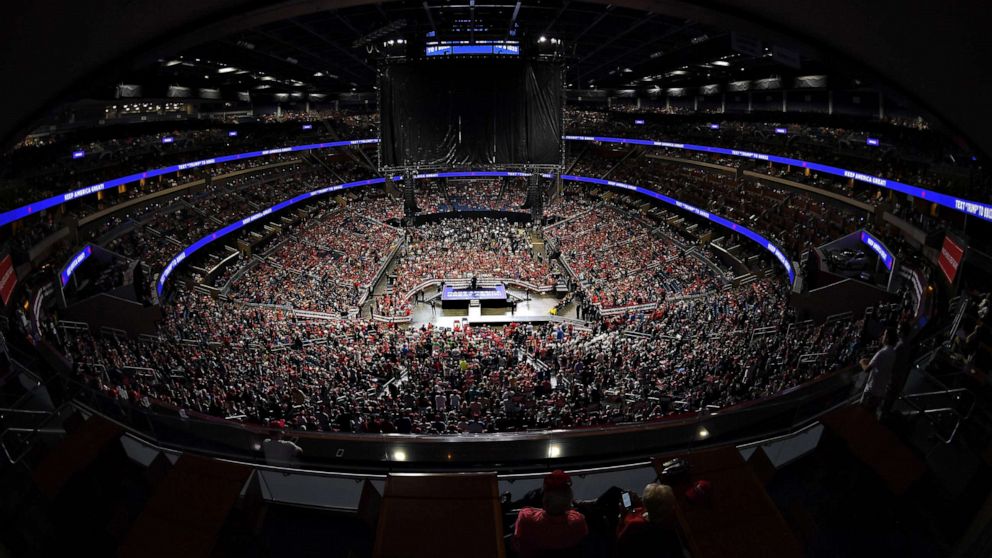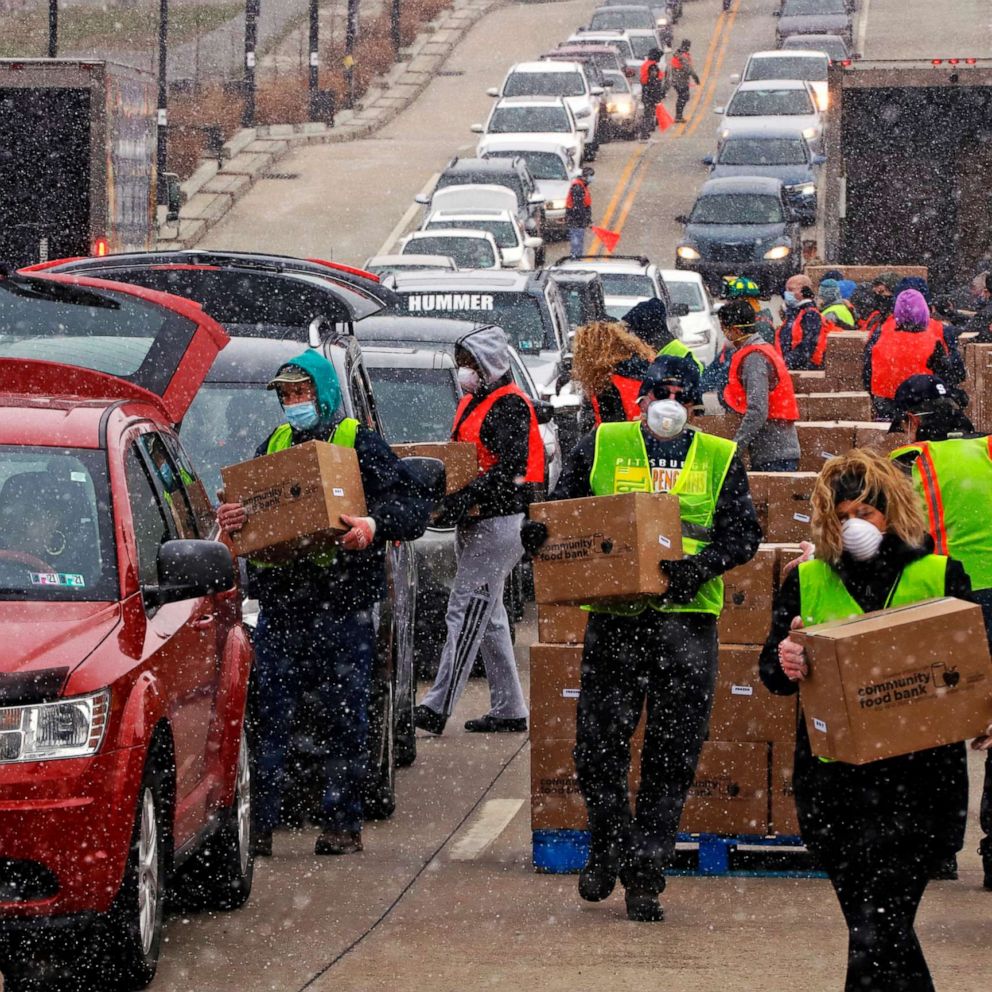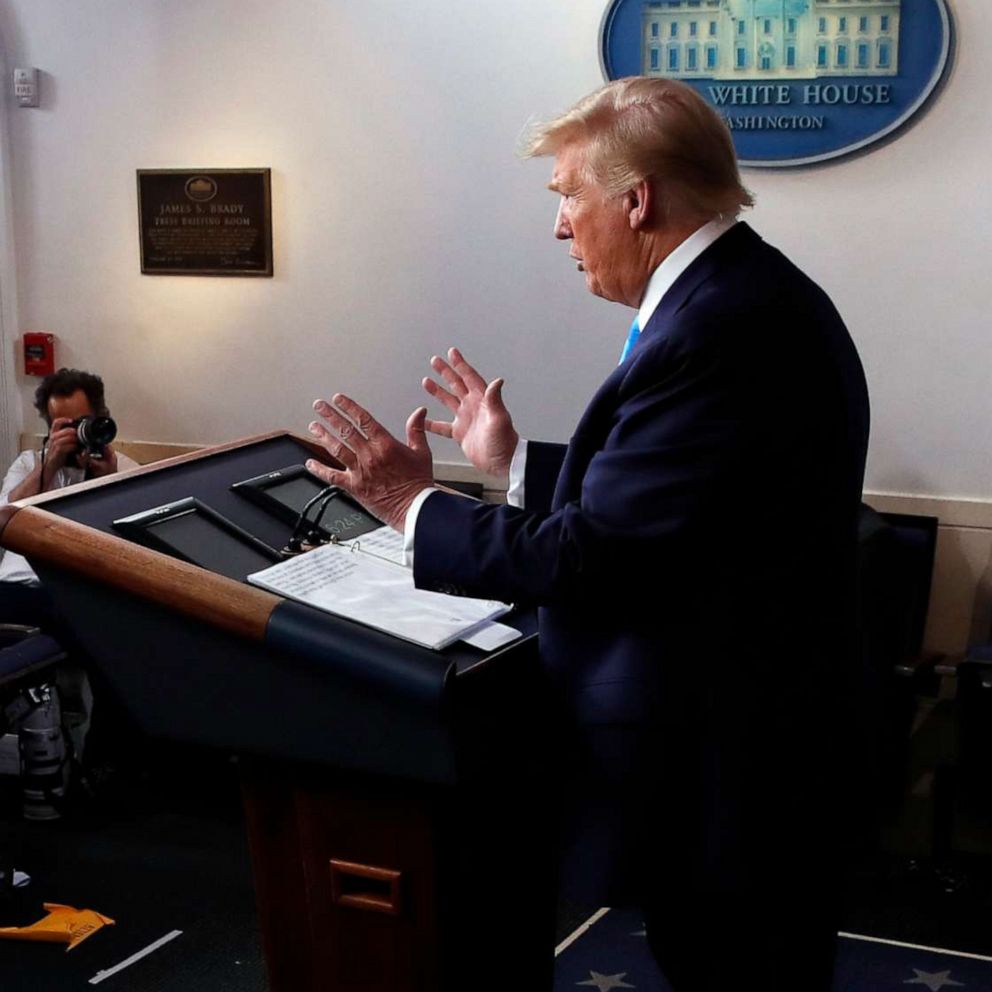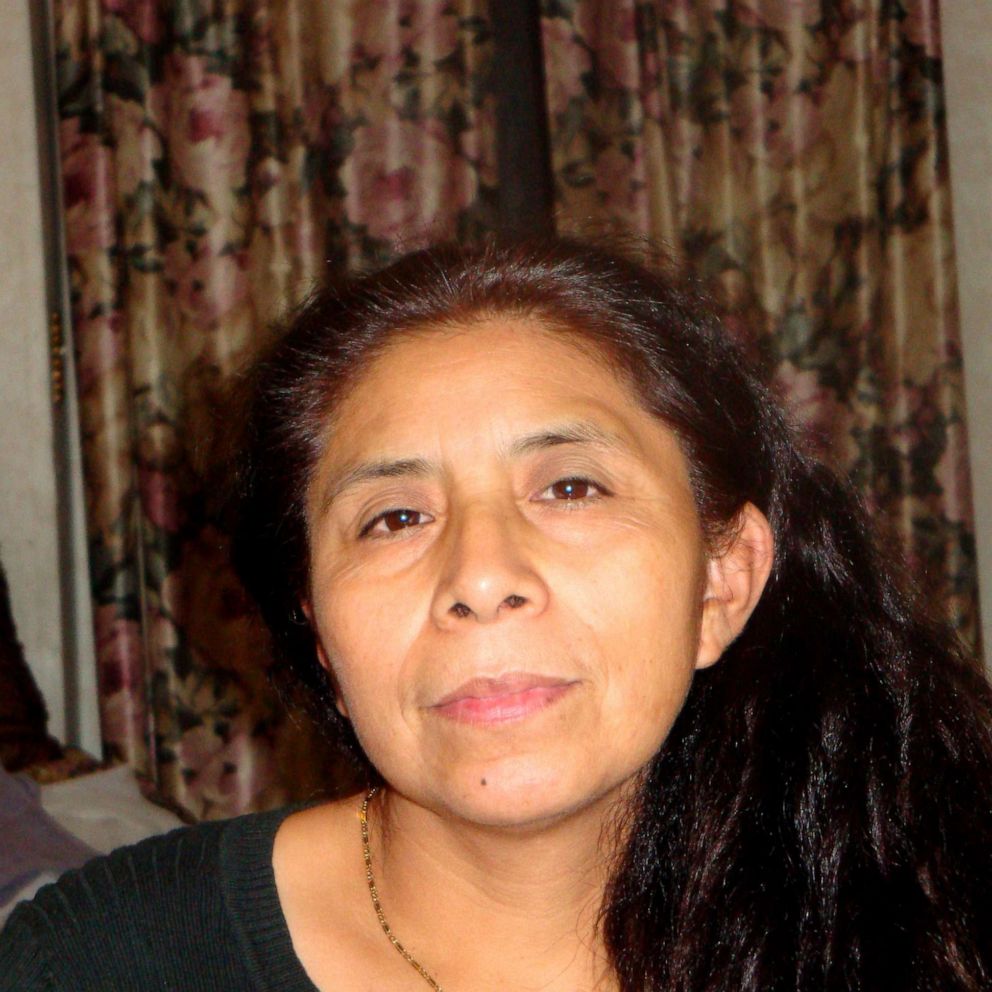Trump campaign vows 'never fear' rallies will return; experts warn large events should return 'later part of 2021'
President Donald Trump's reelection campaign says it's still planning to hold rallies leading up to November's election, despite public health experts warning large gatherings should be put on hold until as late as next year.
Since freezing campaign rallies in March amid the growing coronavirus pandemic, the Trump campaign has repeatedly pledged that the centerpiece events of the president's reelection effort will return.
"This coronavirus will pass and the president is looking forward to getting back out on the campaign trail and holding rallies," Trump campaign communications director Tim Murtaugh told ABC News.
During a digital campaign event earlier this week, which have replaced campaign events for the time being, Murtaugh told supporters to "never fear" and that the president was "certain" rallies would return.
"We will get back to those rallies. Never fear, the president is certain that we're going to be back out there speaking directly to the American people," Murtaugh said.
Behind closed doors, Trump campaign officials have discussed holding rallies in certain states that are deemed low risk and even ways to implement social distancing precautions at future rallies, sources tell ABC News. It's not immediately clear what would characterize a state as "low risk," or when exactly rallies are planned to return.
On a call with governors on Thursday, Trump talked about sporting events bringing fans back into stadiums.
"You'll have maybe where you'll be seated -- we talked about this with [Dr. Fauci] -- where you'll have seats where every three or four seats you have empty, you'll have some fill in, and then ultimately we'll have it fill in as the virus is gone," the president said, according to audio obtained by ABC News.
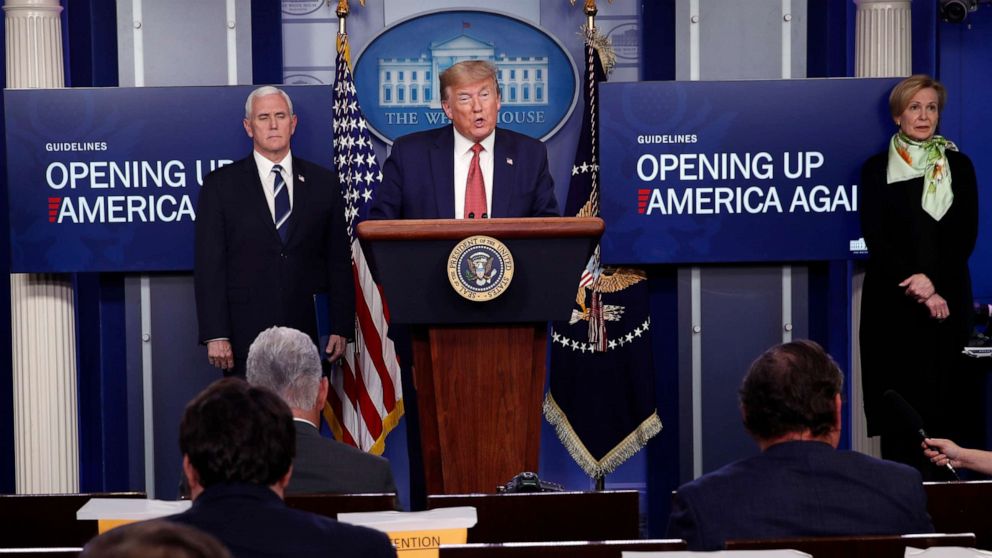
At Thursday's White House press briefing, Trump rolled out broad new federal guidelines for opening up the country and even mentioned that some states could ease restrictions and "reopen" as soon as "literally tomorrow."
When pressed on if the "new normal" moving forward would be "smaller crowds in restaurants and bars," Trump pushed back. "Our normal is if you have 100,000 people in an Alabama football game or 110,000, to be exact, we want 110,000 people. We want every seat occupied. Normal is not going to be where you have a game with 50,000 people."
But as the virus continues to spread across the country and large gatherings are barred in many states to help fight the spread of the coronavirus, public health experts warn against prematurely re-starting the economy while areas around the country still lack crucial supplies. Health experts say the return of events like large political rallies could be detrimental to combating the pandemic.
Dr. Nasia Safdar, the medical director of Infection Control at the University of Wisconsin Hospital and Clinics, said it might not be safe to hold large gatherings of people - sporting events, concerts and political rallies - until "the later part of 2021," when experts estimate a coronavirus vaccine will be developed and mass-produced.
"We hope by that time we'll have a vaccine, which might be an ambitious timeline, but that seems the earliest that one might think of doing that," she said of large gatherings.
"Initially it was restrictions on 500 or more people, then it was it ten, and so on. The easing up I think has to follow the same path. You do a little bit of loosening, see the effect of that, and if all looks good, you can be a little bit [bolder]," she said.
"If one felt that one had to have them it would be an event that would look very different than usual. It might be an event that is restricted to a certain number of people. It probably couldn't be people congregating in closed areas for too long," she said.
Dr. Aaron Carroll, a professor of pediatrics at Indiana University School of Medicine, echoed Safdar's concern, telling ABC News in an email, "Clearly large rallies are going to be a major problem, unless we are totally sure community transmission is really, really, low. I can't see many experts being comfortable with them until we're at herd immunity. I'm certainly not."
"We can be comfortable with this when we have achieved herd immunity. We will either get there through enough time that most people have already been exposed (bad) or because we've had a vaccine (good)," he said.
Members of the president's own coronavirus task force have also raised concerns about large events returning too soon. In an interview with Vanity Fair on Wednesday, Dr. Anthony Fauci was asked about massive concert festivals like Coachella or Lollapalooza returning this summer.
"Well, if there's virus in the community, it makes me really, really nervous. Really nervous because outbreaks and clusters have been the things that have fueled outbreaks in different cities throughout the world," Fauci said.
"The direct answer to your question is that it would make me really nervous if there was virus still circulating," he added.
Some cities have signaled that large gatherings like concerts and conventions won't return until next year.
"It's difficult to imagine us getting together in the thousands anytime soon, so I think we should be prepared for that this year," Los Angeles Mayor Eric Garcetti said in an interview with CNN on Wednesday.
On Thursday, Facebook CEO Mark Zuckerberg announced the company was "canceling any large physical events we had planned with 50 or more people through June 2021."
The president held five campaign rallies in February across the country as the virus spread in the United States. His last one was in North Carolina on March 2.
But on March 10, while the threat of the coronavirus surged, the Trump campaign announced another rally-like "Catholics for Trump" kickoff event in Milwaukee which would feature the president and would take place on March 19.
Twenty-four hours later, the campaign canceled the event.
The president's rallies serve as more than just a local platform for Trump to rev up his base, which they also do. The campaign also has used rallies as a data vacuum to extract voter information on those who attend and who just sign up to attend, which they later can use for get out the vote and fundraising efforts.
"If you had told me three months ago that I would have to plan a campaign strategy without Trump springtime rallies for the good of the country, I wouldn't have believed you. Nevertheless, that's where we are," Trump campaign manager Brad Parscale wrote in an op-ed last week detailing his team's massive shift to digital campaigning.
Some Republican strategists point out that if the president's forced to forgo campaign rallies leading up to November it would be a significant blow.
"There is no doubt that Trump's rallies have been one of the most effective forms of campaigning we've seen in our lifetime. It would be the Democrats' dream come true if this were to come to an end," Republican strategist Jen Kerns told ABC News, while adding that the Trump campaign's "strong digital game" could end up being the X-factor if events remain on hold.
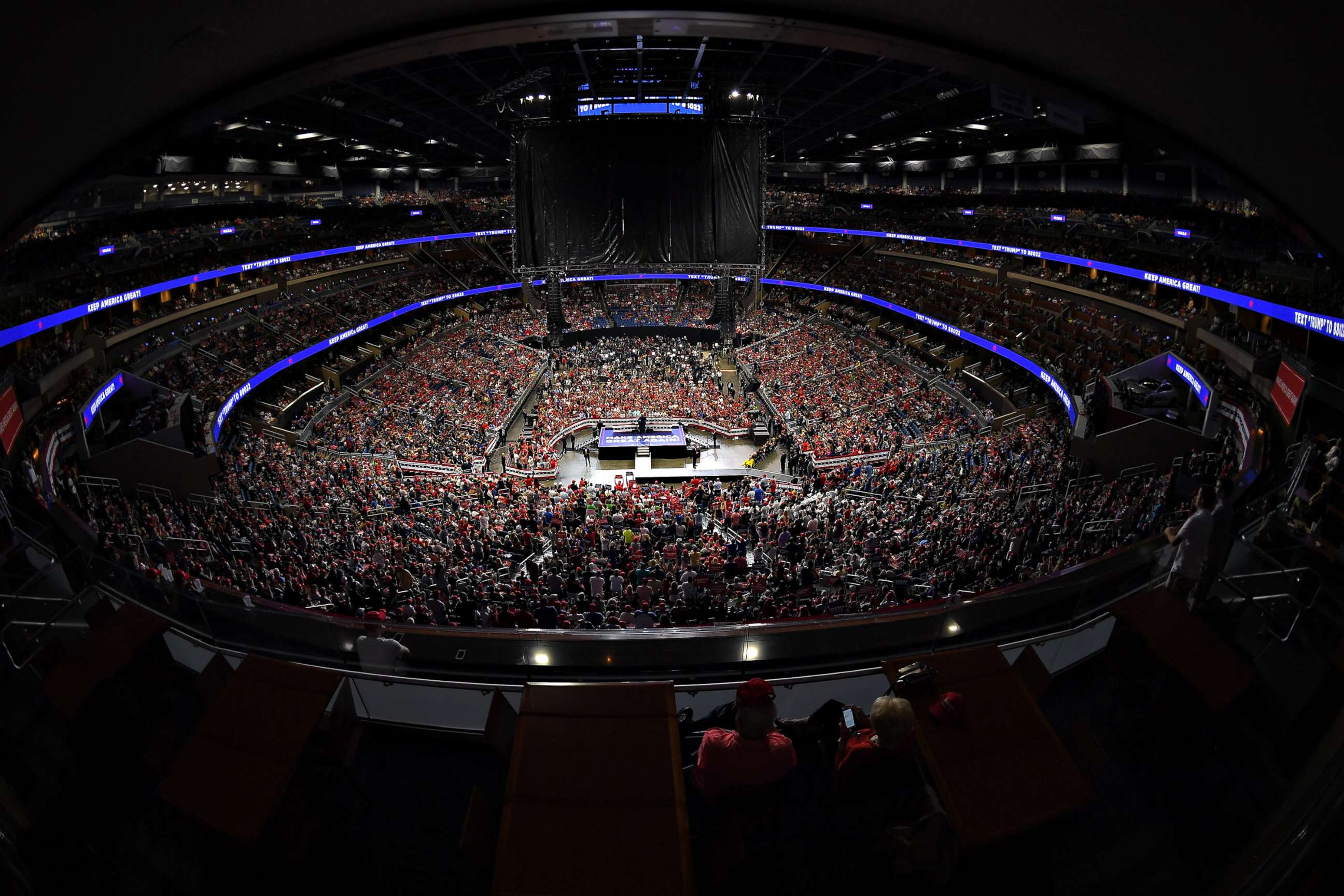
"As people are couch-surfing under lockdown, there will be no shortage of digital messages they'll see from the campaign," Kerns said.
Democrats also point out that the president's large-scare campaign events had served as a boost to his reelection and could impacted him if they remain on hold. "His rallies served as an in-house data collection mill," Democratic strategist Michael Trujillo said. "That is now turned off."
"As for his [reelection] chances, this impacts it for sure, but let's be clear his reelection right now is solely reliant on his showing clear, sober leadership on navigating us out of this pandemic. This is a skill this President has never shown whether as a businessman or Hollywood produced reality TV star," Trujillo added.
Jason Miller, senior communications adviser on the 2016 Trump campaign, said even if rallies are delayed past the election, the Trump campaign's massive digital effort puts them at an advantage over presumptive Democratic nominee Joe Biden.
"I think that conventional wisdom is that not having the rallies would be a big knock on President Trump. But if they were to continue to be delayed, or if they have to be reconstituted as we come back to the fall, the fact of the matter is that all the energy and the enthusiasm is with President Trump," Miller said, adding "When you look at the enthusiasm that the Trump campaign is now generating online with their Trump broadcasts that are reaching, I believe, like a million people an episode, it's pretty staggering."
With rallies on hold, the Trump team has shifted to nightly digital campaign events which have featured the likes of Donald Trump Jr., MyPillow CEO Mike Lindell, and former Florida Attorney General Pam Bondi among others.
And since shifting ground game efforts online on March 13, the Trump campaign has been able to capitalize on its large digital infrastructure by signing up 76,000 new volunteers, making over 13 million volunteer calls to voters and having each digital campaign event top 1 million views, according to the campaign.
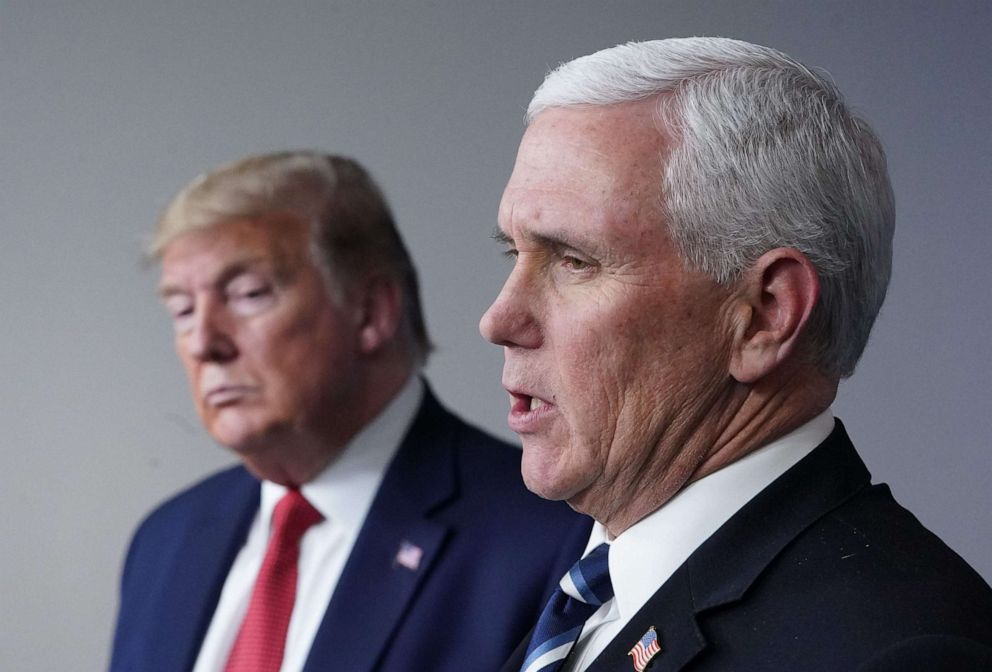
And while national networks had all but stopped taking the rallies live, the Trump campaign had turned each decent into a state as an opportunity to saturate local media markets with interviews and events days and sometimes weeks ahead of each rally.
So far in 2020, the president has held 11 campaign rallies, mostly in states ahead of Democratic primary elections as a way to "troll" his opponents.
"We were all over over the last couple of weeks. We like to troll, we like to go the night before one of their primaries. We just -- We do a little trolling. It's called we do a little trolling," Trump said at his last campaign rally in Charlotte in early March.
And the Trump campaign isn't the only aspect of the president's reelection efforts that's moving forward with large events ahead of November.
The Republican National Committee reiterated on Wednesday that they're still planning to hold their August convention at the Spectrum Center in Charlotte which would bring thousands of people to the are for the four-day event to nominate the president.
Convention CEO Marcia Lee Kelly said Wednesday that while "public safety is paramount," and delegates may have to wear masks and social distance in the arena, they're still moving forward with the convention.
"Four months from now is like a world, a universe, away," she said. "We are moving full steam ahead to … a historic convention."
On the other side, Democrats have signaled they may move to a virtual convention if the coronavirus pandemic continues into the summer.
"Well, we're going to have to do a convention," presumptive Democratic nominee Joe Biden told ABC News' Chief Anchor George Stephanopoulos in early April.
"We may have to do a virtual convention," he added. "But my point is that I think you just got to follow the science."
